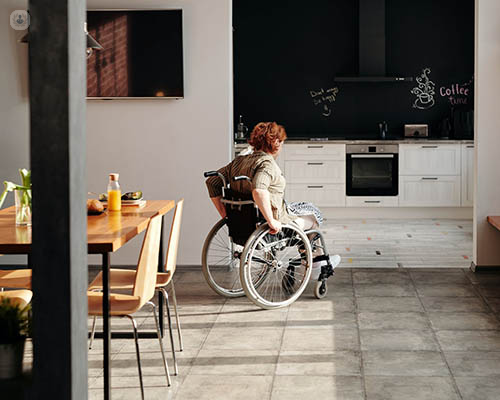How to prepare for hip revision surgery
Escrito por:If you are scheduled to have hip replacement revision surgery, there are certain steps you can take in preparation to ensure that you have a speedy and smooth recovery. We were fortunate to ask one of our expert orthopaedic surgeons Mr Rohit Jain just what this involves exactly - whether that’s by losing weight before surgery, organising a family member to help you out for a few weeks post-operation and installing useful gadgets around the home to make your life easier. Here he explains all.

How do I prepare for hip revision surgery?
Firstly, the patient and surgeon should be absolutely clear as to why revision hip surgery is being carried out. The patient’s expectations should be discussed and set in advance. The patient needs to have made the mental preparation on what to expect after hip revision surgery, which is a much bigger surgery than primary hip replacement.
Before surgery, the patient has a preoperative assessment to make sure there is no underlying disease that they are unaware of, such as diabetes for example, which can otherwise affect the surgery.
There are a few things which the patient can do to optimise themselves ahead of surgery. They can maintain a healthy body weight and if they smoke then should try to stop completely. Maintaining a healthy, nutritious diet is paramount. The body has to heal so if there is not enough nutrition it has a negative impact on how the various tissues repair themselves.
Any form of dental treatment needs to be carried out before surgery and if it can’t then it should be deferred until three months after surgery. All medications, including herbal supplements and vitamins, need to be disclosed to the surgeon and preop assessment team.
How can I make my home post-hip surgery friendly?
At home, you can remove any loose rugs so that you don’t accidentally slip. You can make sure that someone is available to help you, especially two to three weeks after surgery.
It is important to have set up space for sleeping downstairs so that there is no need to climb the stairs. It is recommended to sit in a recliner chair or a chair with arms. Your legs may swell up after surgery, so it is advised that you keep your feet up on a reclining chair to prevent this. You can elevate your toilet seat, use a grasping device for putting on shoes and socks and install handrails in your bathtub. The hospital will give you this special equipment.
Is there significant scarring from hip revision surgery?
There is usually not much scarring from hip revision. The length of the cut usually depends upon the patient’s body weight and how muscular they are. If they are bigger, the length of the incision needs to be increased to allow adequate exposure of the joint to do surgery.
It also depends on the nature of the surgery and whether we are replacing only part of the hip, in which case the length will be smaller. If we are revising all of the implant, the length of the incision will need to be a lot longer.
We use dissolvable stitches when closing up during surgery, which means that none need to be taken out post-operation. We use special glue, butterfly strips and, in some high-risk cases, we use a special dressing which is vacuum-based. This does not need to be changed for a week and it has a watertight closure, which stabilises the wound for days and reduces the risk of infection.
How successful are hip revisions?
By and large, hip revision is successful surgery. Hip revision is successful if the patient and the surgeon are fully aware of the various expectations, which need to be made clear from the beginning. The outcome also depends on the patient factors as mentioned above (weight, nutrition, overall health etc.) and surgical factors. But your surgeon will discuss all of these in advance to ensure that you have the best possible outcome in your case.
READ MORE: WHEN IS HIP REVISION NECESSARY?
Do not hesitate to make an appointment with Mr Jain here via his Top Doctor’s profile if you would like his expert medical opinion for your hip pain.


